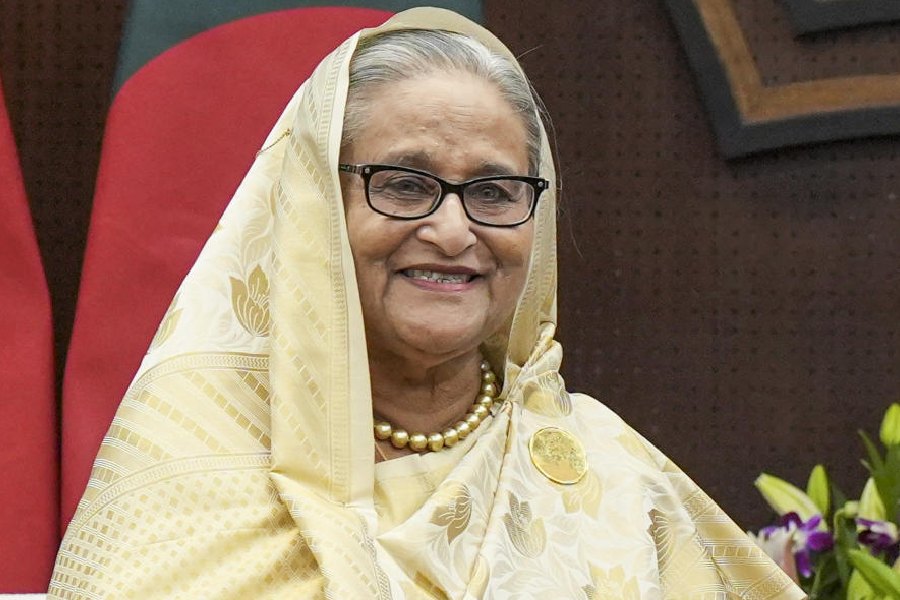A writ petition filed in a high court in Bangladesh seeking a ban on ousted Prime Minister Sheikh Hasina's Awami League and several other parties was withdrawn on Tuesday.
Leaders of the anti-discrimination students' movement, which led to the ouster of Hasina's 15-year regime on August 5, on Monday in a petition in Dhaka High Court sought the court's directions to prevent the Awami League and 10 other parties from conducting political activities in the country.
Court officials and lawyers said three top leaders or coordinators of the movement -- Sarjis Alam, Hasnat Abdullah and Hasibul Islam -- decided not to proceed with the petition that also questioned the past three general elections in 2014, 2018 and 2024 which installed Hasina-led Awami League to power.
The elections were staged amid allegations of massive vote manipulation or boycott by the main opposition Bangladesh Nationalist Party (BNP) led by former prime minister Begum Khaleda Zia and several other parties.
The movement leaders, however, preferred not to proceed with the second writ either that questioned the legitimacy of these three parliamentary elections.
The two writs, listed by a two-member high court bench for hearing on Tuesday, were withdrawn as the proceedings began in the morning.
The petitioners' lawyers informed the bench that their clients would not proceed with the writs.
The bench comprising Justice Fatema Najib and Justice Shikdar Mahmudur Raji subsequently ordered the writs be removed from the list.
Alongside Awami League, the writ petition was filed against Jatiya Party (Ershad), Jatiya Party (Manju), Ganatantri Party, Jatiya Samajtantrik Dal, Bikalpa Dhara Bangladesh, Bangladesh Tarikat Federation, Communist Party of Bangladesh (CPB), Liberal Democratic Party (LDP), Communist Party of Bangladesh (Marxist-Leninist) (Barua), and Workers Party of Bangladesh.
In response to their inclusion in the petition, the LDP demanded an apology from the petitioners.
The CPB said they might have been mentioned out of a misunderstanding, and the Jatiya Party (Ershad) said they would address the matter through legal means.
The right-wing LDP and left-wing CPB were harsh critics of the Awami League regime and did not take part in the elections.
The BNP, which has appeared as the major political force in Bangladesh politics following Hasina's ouster, however, said they opposed a ban on any political party for inclusiveness in elections.Meanwhile, the interim government on Monday evening said it had yet not decided upon banning any political party.
“The government only has banned Bangladesh Chhatra League (pro-Awami League student organisation). It did not decide at this point to ban any other political party,” a spokesman from the Bangladesh interim government's media wing said in a briefing.
The students' movement in a rally on October 22 at Central Shaheed Minar here announced a five-point demand, including the ban on Awami League and the removal of President Mohammad Shahabuddin after protests erupted following his remarks that he did not receive Hasina's resignation.
The first of their five-point demands was the scrapping of the country’s original 1972 Constitution which was drafted a year after Bangladesh’s establishment following a nine-month Liberation War against Pakistan.
The movement leaders received no positive response from the BNP on the question of the president’s removal or scrapping of the 1972 constitution either as the party said they did not want any constitutional crisis and rather stressed a general elections as soon as possible.
An interim government led by Nobel Laureate Professor Muhammad Yunus was installed in Bangladesh on August 8 after Hasina resigned and fled to India following massive protests against her government that killed over 1,000 persons since mid-July.
Except for the headline, this story has not been edited by The Telegraph Online staff and has been published from a syndicated feed.












